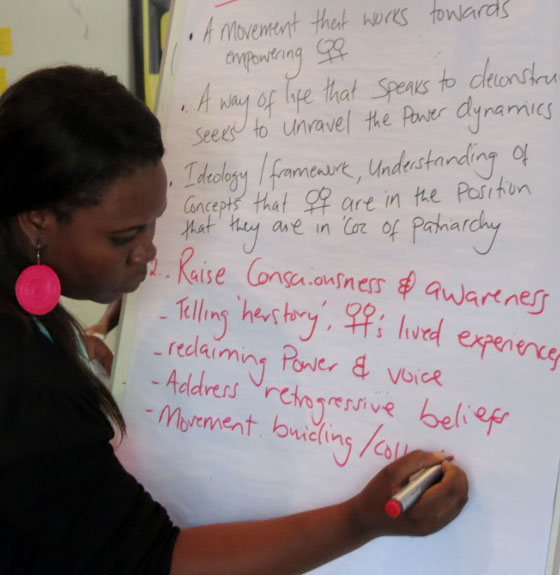“I’ve never engaged in this kind of writing before. I’ve given my testimonies to other people. But I have never tried to put it on paper for myself so that others can learn from my experiences,” says Malawian activist Mirriam Munthali at the first JASS Southern Africa Regional Writeshop. Mirriam and nine other women activists from Zambia, Malawi and Zimbabwe explored how to create and share their knowledge as feminist movement builders by telling stories of the real struggles on the frontline.
I come from a community dealing with unsafe abortions, stigma and discrimination because of HIV status and also because of deformities caused by HIV treatment, harmful cultural practices, and violence against women… Now, with the skills I am taking from this workshop, I can collect and document women’s stories so that people will hear what is happening.
The Writeshop – designed with the goal of enabling more African women to tell their own stories to the world about realities on the continent – gathered a diverse group of activists. Young women, sex workers, market women organisers and HIV activist leaders all discovered that they had powerful stories to tell and that they could write potent pieces to share them. The challenges that African women writers and journalists face in getting their voices heart are obvious as Yvonne Leina Chi says,
In most African communities, the woman’s place is in the backyard…. Over the years, with modernization and the influx of the Western culture, women are beginning to abandon the domestic world in favor of more public occupations that steadily draw them into more peer-like relationships with men. This phenomenon has not succeeded in erasing the mentality that women are inferior to men physically, intellectually, spiritually, emotionally, etc. Women who today find themselves in historically male-dominated professions, like journalism, face enormous challenges.
While it’s widely documented how few women’s voices appear in mainstream media, international analysis about Africa – even features about women – go as far as to silence women, stereotyping women as victims of too many babies, too much work and too much violence. But there is so much more to bring to the table and more than a single story to tell for women activists like Mirriam, “I am learning about storytelling as a feminist, and I feel good about that.”
On International Women’s Day – let’s celebrate the power of women’s voices to make real change happen by breaking the silence.


























